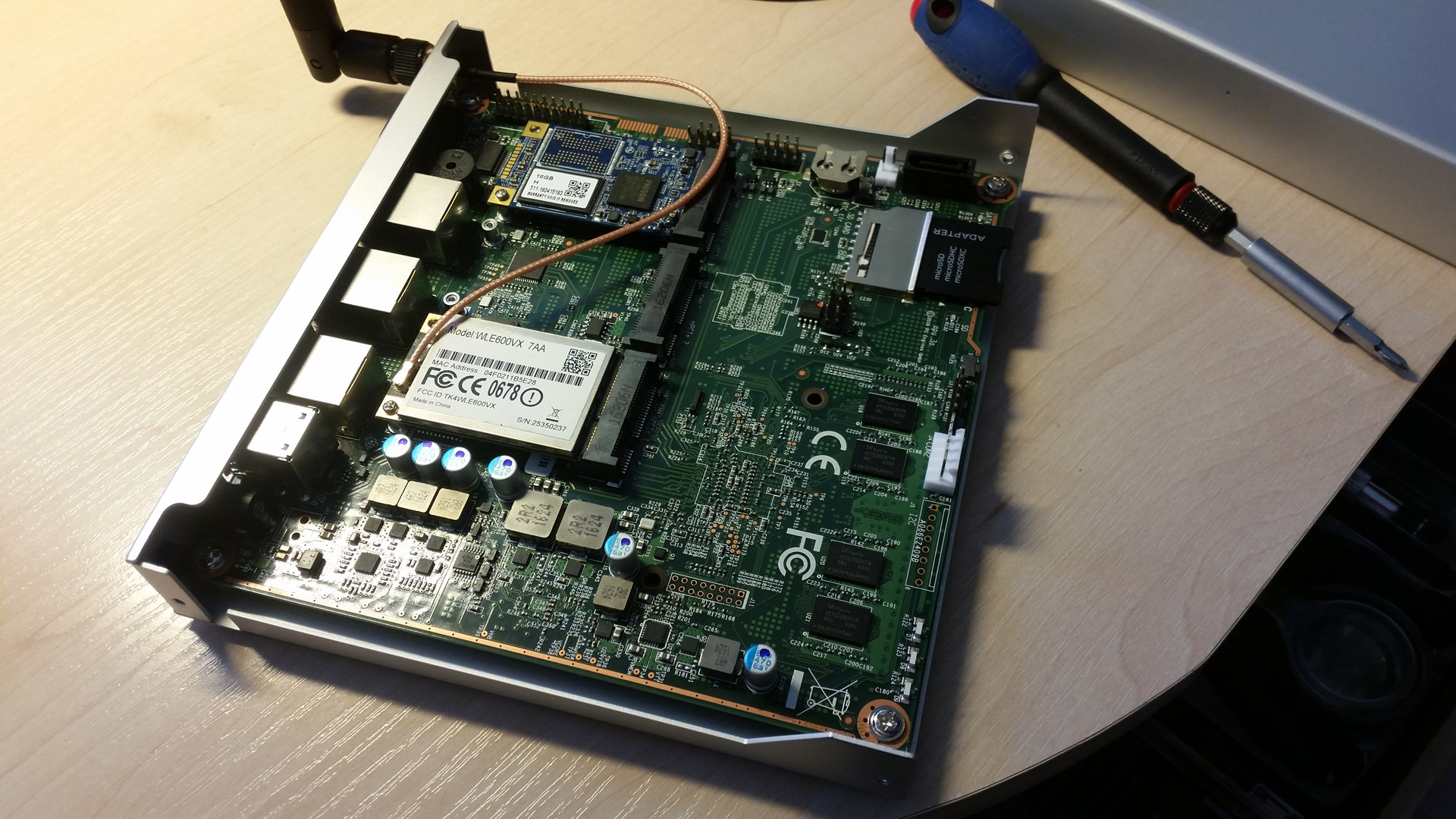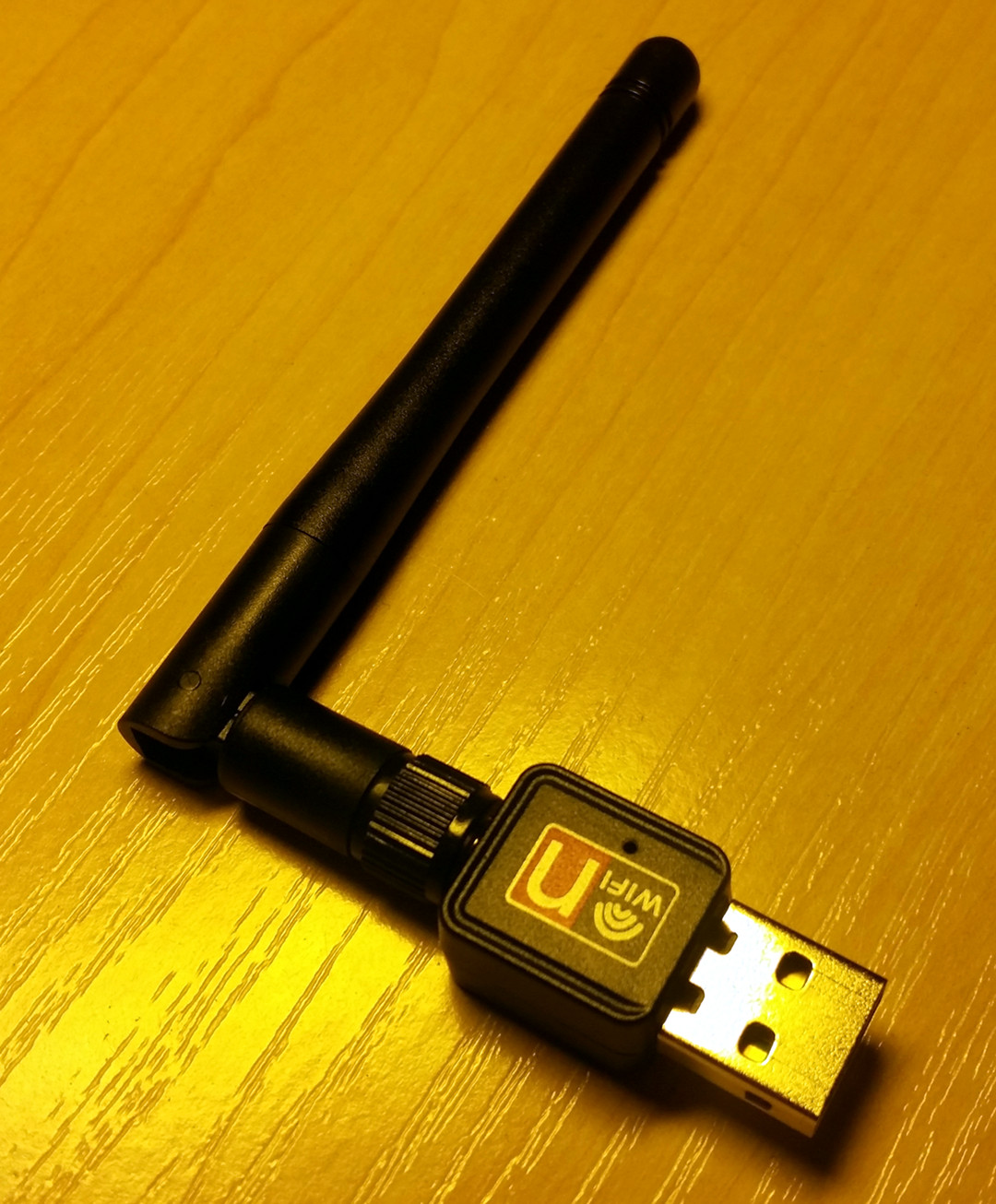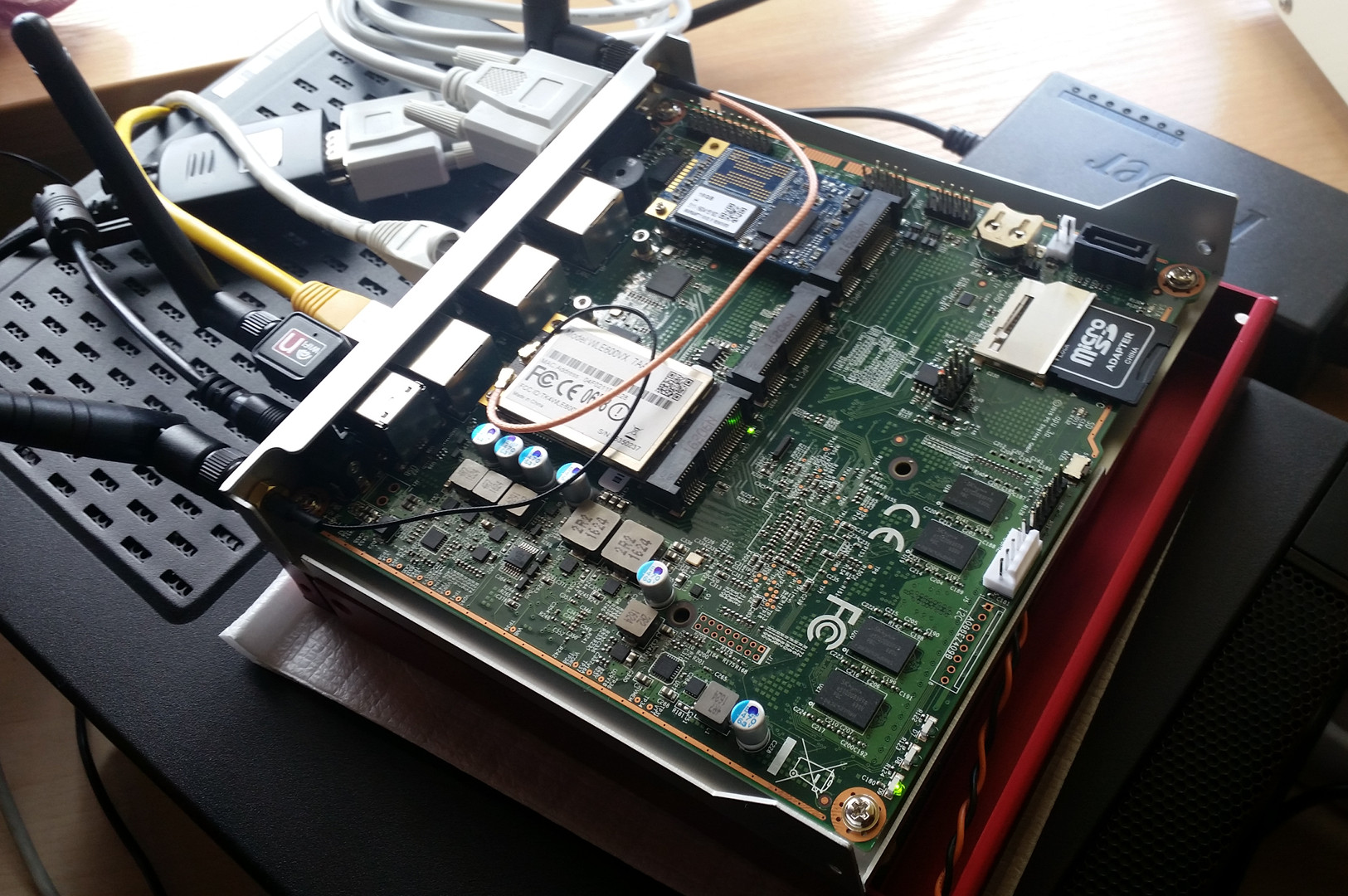This guide should be considered as a simple walk-through for using APU3 platform
in some generic use-cases. I’m trying to explain how to work with the device and
use it in a generic manner. There is a part about the coreboot firmware, which
could be used as a reference of how to start customizing it for own purposes.
Configuring the hardware
At first, let’s figure out some basic requirements for our new device:
- It will be wireless router with some advenced functionality provided by
OpenWRT.
- In order for it to be wireless, we need to add WiFi network adapters.
- I want it to be dual-band simultaneous connection, so we will need 2 separate
WiFi adapters.
- Operating system will be placed on µSD card.
- There will be an additional storage in the form of mSata disk.
APU3 has 3 mPcie slots. Unfortunately it supports PCI express only on slot
mPCIe 1, so WiFi card has to use it. For the second WiFi card, we could use
mPCIe 2 slot, but we would need USB only type, which are rare. Instead I’m
using some cheap Ralink RT5370 based USB dongle WiFi adapter. mPCIe 3 slot
will be used for mSata drive.

For the OS drive, I’ll use some generic µSD card with adapter.
mPCIe 2 slot could be used in future for GSM modem or some other kind of USB
device in the form of mPcie card.
Getting the sources
We will use latest stable version which is Chaos Calmer, in order to be
compatible with upstream packages. Thanks to that we can just use the opkg to
download new version of packages from the main OpenWRT’s repositories.
The sources we need are located on github.
Let’s clone the needed version:
1
2
3
4
5
6
7
|
$ git clone -b chaos_calmer https://github.com/openwrt/openwrt.git
Cloning into 'openwrt'...
remote: Counting objects: 360802, done.
remote: Compressing objects: 100% (5/5), done.
remote: Total 360802 (delta 4), reused 2 (delta 2), pack-reused 360795
Receiving objects: 100% (360802/360802), 132.94 MiB | 8.24 MiB/s, done.
Resolving deltas: 100% (241401/241401), done.
|
Building
To build our first image we first need to configure the OpenWRT:
1
2
|
cd openwrt
make menuconfig
|
Our target is APU system, which has AMD x86_64 CPU. So let’s use generic
settings:
- Target System > x86
- Subtarget > x86_64
… and then Exit and make.
After compilation our image is in bin/x86 dir. We need a SD card to burn the
image and boot the system on the target platform. On my host system, card is
present under the device file /dev/sde.
Warning! Carefully check the device the card is present on your system. This
is potentially dangerous operation and can lead to lost data, when used wrong
device!
1
2
|
cd bin/x86
sudo dd if=openwrt-x86-64-combined-ext4.img of=/dev/sde bs=4M
|
First boot
Default username after first boot is root and no password. Password should
be set using passwd.
To make the first boot we need some kind of serial adapter (USB to RS232) and
null-modem cable. There is a RS232 port on the back of the APU board. We need to
connect it there.
To make the connection, I’m using screen, but other kind could be used (e.g.
minicom). Default parameters for COM port are 115200 8N1. This is the command
I’m using:
1
|
screen /dev/ttyUSB0 115200
|
Immediately after powering the device, the coreboot welcome string should be
seen and one could enter simple boot menu. Default configuration should be ok
and SD card will have priority over different devices (it can be changed).
First OpenWRT boot will most probably hang on this string:
1
2
3
4
5
6
7
8
9
10
11
12
13
|
...
[ 2.424534] bridge: automatic filtering via arp/ip/ip6tables has been deprecated. Update your scripts to load br_netfilter if you need this.
[ 2.437154] 8021q: 802.1Q VLAN Support v1.8
[ 2.441432] NET: Registered protocol family 40
[ 2.447418] rtc_cmos 00:01: setting system clock to 2016-07-25 00:04:49 UTC (1469405089)
[ 2.455798] Waiting for root device PARTUUID=6c097903-02...
[ 2.659998] usb 3-1: new high-speed USB device number 2 using ehci-pci
[ 2.666595] usb 4-1: new high-speed USB device number 2 using ehci-pci
[ 2.820863] hub 3-1:1.0: USB hub found
[ 2.824725] hub 4-1:1.0: USB hub found
[ 2.828501] hub 3-1:1.0: 4 ports detected
[ 2.832586] hub 4-1:1.0: 4 ports detected
[ 2.950313] Switched to clocksource tsc
|
Problem lies here:
[ 2.455798] Waiting for root device PARTUUID=6c097903-02...
SDHCI controller issue
After short investigation it appears, that we don’t have support for the SDHCI
controller on APU board, so we need to enable it. We need to modify the kernel
configuration, so we use this command:
In the config we need to select those drivers:
- Device Drivers > MMC/SD/SDIO card support:
- MMC block device driver
- Secure Digital Host Controller Interface support
- SDHCI support on PCI bus
Now the system should boot without problems.
Network problems
After booting the systems it appears we don’t have any connectivity (ethernet
nor wifi). When trying ifconfig -a we can see only the lo interface.
Let’s install some additional packages, which should help us investigate
- Base system > busybox > Customize busybox options > Linux System Utilities:
- Base system > wireless-tools
When the image is built and system is booted on target we can use lspci -k to
check which devices have kernel modules assigned to them and which don’t. This
lspci flavour is pretty poor, compared to usual one, supplied with main Linux
distributions, but should be enough for our uses.
Among others, we can find these devices (VID:DID), which look interesting:
1
2
3
4
|
01:00.0 Class 0200: 8086:1539
02:00.0 Class 0200: 8086:1539
03:00.0 Class 0200: 8086:1539
04:00.0 Class 0280: 168c:003c
|
According to this page we’re looking for these
devices:
8086:1539 - this is Intel Ethernet controller (I211 Gigabit Network
Connection)168c:003c - this is Atheros QCA986x/988x 802.11ac Wireless Network Adapter
We need to find drivers for those. It seems, that Intel is using CONFIG_IGB
kernel option for its driver. Module for Atheros card is in OpenWRT. Let’s deal
first with ethernet controllers:
Need to mark this driver:
- Device Drivers > Network device support > Ethernet driver support:
- Intel(R) 82575/82576 PCI-Express Gigabit Ethernet support
As for the rest:
First let’s mark the driver for our wireless card:
- Kernel modules > Wireless Drivers:
And also some packages we’ll need to set up the access-point:
Unfortunately, during my build I got and error. After rerunning make V=s it
appears that kernel hasn’t got the full configuration it wants. I managed get by
this problem checking this option in make kernel_menuconfig:
- Power management and ACPI options:
- ACPI (Advanced Configuration and Power Interface) Support
After successful build and boot. I got:
1
2
3
4
5
6
7
8
9
10
11
12
13
14
15
16
17
18
19
20
21
22
23
24
25
26
27
28
29
30
31
32
33
34
35
36
37
38
39
40
41
42
43
44
45
46
47
48
49
|
root@OpenWrt:/# ifconfig -a
br-lan Link encap:Ethernet HWaddr 00:0D:B9:44:11:B8
inet addr:192.168.1.1 Bcast:192.168.1.255 Mask:255.255.255.0
inet6 addr: fd0e:a001:d70e::1/60 Scope:Global
UP BROADCAST MULTICAST MTU:1500 Metric:1
RX packets:0 errors:0 dropped:0 overruns:0 frame:0
TX packets:0 errors:0 dropped:0 overruns:0 carrier:0
collisions:0 txqueuelen:0
RX bytes:0 (0.0 B) TX bytes:0 (0.0 B)
eth0 Link encap:Ethernet HWaddr 00:0D:B9:44:11:B8
UP BROADCAST MULTICAST MTU:1500 Metric:1
RX packets:0 errors:0 dropped:0 overruns:0 frame:0
TX packets:0 errors:0 dropped:0 overruns:0 carrier:0
collisions:0 txqueuelen:1000
RX bytes:0 (0.0 B) TX bytes:0 (0.0 B)
Memory:f7900000-f791ffff
eth1 Link encap:Ethernet HWaddr 00:0D:B9:44:11:B9
UP BROADCAST MULTICAST MTU:1500 Metric:1
RX packets:0 errors:0 dropped:0 overruns:0 frame:0
TX packets:0 errors:0 dropped:0 overruns:0 carrier:0
collisions:0 txqueuelen:1000
RX bytes:0 (0.0 B) TX bytes:0 (0.0 B)
Memory:f7a00000-f7a1ffff
eth2 Link encap:Ethernet HWaddr 00:0D:B9:44:11:BA
BROADCAST MULTICAST MTU:1500 Metric:1
RX packets:0 errors:0 dropped:0 overruns:0 frame:0
TX packets:0 errors:0 dropped:0 overruns:0 carrier:0
collisions:0 txqueuelen:1000
RX bytes:0 (0.0 B) TX bytes:0 (0.0 B)
Memory:f7b00000-f7b1ffff
lo Link encap:Local Loopback
inet addr:127.0.0.1 Mask:255.0.0.0
inet6 addr: ::1/128 Scope:Host
UP LOOPBACK RUNNING MTU:65536 Metric:1
RX packets:240 errors:0 dropped:0 overruns:0 frame:0
TX packets:240 errors:0 dropped:0 overruns:0 carrier:0
collisions:0 txqueuelen:0
RX bytes:16320 (15.9 KiB) TX bytes:16320 (15.9 KiB)
wlan0 Link encap:Ethernet HWaddr 04:F0:21:1B:5E:28
BROADCAST MULTICAST MTU:1500 Metric:1
RX packets:0 errors:0 dropped:0 overruns:0 frame:0
TX packets:0 errors:0 dropped:0 overruns:0 carrier:0
collisions:0 txqueuelen:1000
RX bytes:0 (0.0 B) TX bytes:0 (0.0 B)
|
So I’ve got the network.
Basic configuration
It’s good idea to set the default password using passwd utility. Thanks to
this we can login using the SSH connection.
If you want to add your public key to authorized_keys file, which is usually
placed under .ssh dir in user’s home dir, it has to be placed in
/etc/dropbear/ dir or it will be ignored. Make sure that permissions to the
file are also set right (600).
We can also set some other IP address for the ethernet connection, if our host
computer occupies the one or is using other mask. In my case, my host computer
has static address, which happens to be the same as the default one in OpenWRT.
Here’s short example how to change it:
1
2
3
4
5
6
7
8
9
10
11
12
13
14
15
16
17
18
19
20
21
22
23
24
|
root@OpenWrt:/# uci show network
network.loopback=interface
network.loopback.ifname='lo'
network.loopback.proto='static'
network.loopback.ipaddr='127.0.0.1'
network.loopback.netmask='255.0.0.0'
network.lan=interface
network.lan.ifname='eth0'
network.lan.type='bridge'
network.lan.proto='static'
network.lan.ipaddr='192.168.1.1'
network.lan.netmask='255.255.255.0'
network.lan.ip6assign='60'
network.wan=interface
network.wan.ifname='eth1'
network.wan.proto='dhcp'
network.wan6=interface
network.wan6.ifname='eth1'
network.wan6.proto='dhcpv6'
network.globals=globals
network.globals.ula_prefix='fd0e:a001:d70e::/48'
root@OpenWrt:/# uci set network.lan.ipaddr=192.168.1.254
root@OpenWrt:/# uci commit
root@OpenWrt:/# /etc/init.d/network restart
|
We also want to enable the AP using the wifi adapter:
1
2
3
4
5
6
|
root@OpenWrt:~# uci set wireless.radio0.disabled=0
root@OpenWrt:~# uci set wireless.@wifi-iface[0].encryption='psk2+aes'
root@OpenWrt:~# uci set wireless.@wifi-iface[0].key='key123'
root@OpenWrt:~# uci set wireless.@wifi-iface[0].ssid='YourSSID'
root@OpenWrt:~# uci commit
root@OpenWrt:~# wifi
|
After a while you can establish a connection with SSID YourSSID and password
key123.
Second wireless interface
The second adapter is connected to the USB port on the back of the device. It’s
some cheap Ralink RT5370 based chip, which are popular and in nice form factor
(small footprint and removable antenna).

Using the lsusb it’s detected like that:
1
|
Bus 001 Device 002: ID 148f:5370
|
In order to enable it, we need additional kernel module, which is available in
OpenWRT:
- Kernel modules > Wireless Drivers > kmod-rt2800-usb
After building and booting the new image, interface should be available by
checking ifconfig -a.
Unfortunately we don’t have the new interface in OpenWRT’s configuration system.
Right now the /etc/config/wireless file looks like that:
1
2
3
4
5
6
7
8
9
10
11
12
13
14
15
|
config wifi-device 'radio0'
option type 'mac80211'
option hwmode '11a'
option path 'pci0000:00/0000:00:02.5/0000:04:00.0'
option htmode 'VHT80'
option disabled '0'
option channel '36'
config wifi-iface
option device 'radio0'
option network 'lan'
option mode 'ap'
option ssid 'YourSSID'
option encryption 'psk2+aes'
option key 'key123'
|
In order to add new device, I found that it’s easiest to generate generic one,
with all interfaces detected and add the new one to the file. We can do it this
way:
1
2
3
4
5
6
7
8
9
10
11
12
13
14
15
16
17
18
19
20
21
22
23
24
25
26
27
28
29
30
|
root@OpenWrt:~# wifi detect
config wifi-device radio0
option type mac80211
option channel 36
option hwmode 11a
option path 'pci0000:00/0000:00:02.5/0000:04:00.0'
option htmode VHT80
option disabled 1
config wifi-iface
option device radio0
option network lan
option mode ap
option ssid OpenWrt
option encryption none
config wifi-device radio1
option type mac80211
option channel 11
option hwmode 11g
option path 'pci0000:00/0000:00:10.0/usb1/1-2/1-2:1.0'
option htmode HT20
option disabled 1
config wifi-iface
option device radio1
option network lan
option mode ap
option ssid OpenWrt
option encryption none
|
There is an additional section with the new adapter (radio1 and wifi-iface
for radio1). We can copy this section to /etc/config/wireless and change the
options we need. After that, we can run wifi command to accept the settings
and enable all radios.
Some bandwidth results
Here are some results I’ve got when done some tests using iperf3.
802.11a (the WLE600VX card)
VHT80 mode
1
2
3
4
5
6
7
8
9
10
11
12
13
14
15
16
17
18
19
20
21
|
-----------------------------------------------------------
Server listening on 5201
-----------------------------------------------------------
Accepted connection from 192.168.1.121, port 60530
[ 5] local 192.168.1.254 port 5201 connected to 192.168.1.121 port 60532
[ ID] Interval Transfer Bandwidth
[ 5] 0.00-1.00 sec 17.4 MBytes 146 Mbits/sec
[ 5] 1.00-2.00 sec 22.6 MBytes 189 Mbits/sec
[ 5] 2.00-3.00 sec 24.2 MBytes 203 Mbits/sec
[ 5] 3.00-4.00 sec 25.1 MBytes 211 Mbits/sec
[ 5] 4.00-5.00 sec 25.7 MBytes 215 Mbits/sec
[ 5] 5.00-6.00 sec 25.2 MBytes 212 Mbits/sec
[ 5] 6.00-7.00 sec 25.4 MBytes 213 Mbits/sec
[ 5] 7.00-8.00 sec 25.4 MBytes 213 Mbits/sec
[ 5] 8.00-9.00 sec 27.6 MBytes 232 Mbits/sec
[ 5] 9.00-10.00 sec 31.0 MBytes 260 Mbits/sec
[ 5] 10.00-10.02 sec 663 KBytes 243 Mbits/sec
- - - - - - - - - - - - - - - - - - - - - - - - -
[ ID] Interval Transfer Bandwidth Retr
[ 5] 0.00-10.02 sec 251 MBytes 210 Mbits/sec 0 sender
[ 5] 0.00-10.02 sec 250 MBytes 209 Mbits/sec receiver
|
HT40 mode
1
2
3
4
5
6
7
8
9
10
11
12
13
14
15
16
17
18
19
20
21
|
-----------------------------------------------------------
Server listening on 5201
-----------------------------------------------------------
Accepted connection from 192.168.1.121, port 60220
[ 5] local 192.168.1.254 port 5201 connected to 192.168.1.121 port 60222
[ ID] Interval Transfer Bandwidth
[ 5] 0.00-1.00 sec 8.90 MBytes 74.7 Mbits/sec
[ 5] 1.00-2.00 sec 10.1 MBytes 85.1 Mbits/sec
[ 5] 2.00-3.00 sec 10.9 MBytes 91.3 Mbits/sec
[ 5] 3.00-4.00 sec 11.0 MBytes 92.3 Mbits/sec
[ 5] 4.00-5.00 sec 11.1 MBytes 93.3 Mbits/sec
[ 5] 5.00-6.00 sec 11.2 MBytes 93.7 Mbits/sec
[ 5] 6.00-7.00 sec 13.7 MBytes 115 Mbits/sec
[ 5] 7.00-8.00 sec 13.8 MBytes 116 Mbits/sec
[ 5] 8.00-9.00 sec 13.6 MBytes 114 Mbits/sec
[ 5] 9.00-10.00 sec 13.6 MBytes 114 Mbits/sec
[ 5] 10.00-10.02 sec 307 KBytes 112 Mbits/sec
- - - - - - - - - - - - - - - - - - - - - - - - -
[ ID] Interval Transfer Bandwidth Retr
[ 5] 0.00-10.02 sec 118 MBytes 99.1 Mbits/sec 0 sender
[ 5] 0.00-10.02 sec 118 MBytes 99.0 Mbits/sec receiver
|
802.11n (the Ralink’s RT5370 adapter)
HT20 mode
1
2
3
4
5
6
7
8
9
10
11
12
13
14
15
16
17
18
19
20
21
|
-----------------------------------------------------------
Server listening on 5201
-----------------------------------------------------------
Accepted connection from 192.168.1.121, port 60032
[ 5] local 192.168.1.254 port 5201 connected to 192.168.1.121 port 60034
[ ID] Interval Transfer Bandwidth
[ 5] 0.00-1.00 sec 2.72 MBytes 22.8 Mbits/sec
[ 5] 1.00-2.00 sec 2.68 MBytes 22.5 Mbits/sec
[ 5] 2.00-3.00 sec 2.64 MBytes 22.1 Mbits/sec
[ 5] 3.00-4.00 sec 2.78 MBytes 23.3 Mbits/sec
[ 5] 4.00-5.00 sec 2.76 MBytes 23.1 Mbits/sec
[ 5] 5.00-6.00 sec 2.72 MBytes 22.8 Mbits/sec
[ 5] 6.00-7.00 sec 2.71 MBytes 22.7 Mbits/sec
[ 5] 7.00-8.00 sec 2.78 MBytes 23.3 Mbits/sec
[ 5] 8.00-9.00 sec 2.78 MBytes 23.4 Mbits/sec
[ 5] 9.00-10.00 sec 2.73 MBytes 22.9 Mbits/sec
[ 5] 10.00-10.02 sec 52.3 KBytes 18.7 Mbits/sec
- - - - - - - - - - - - - - - - - - - - - - - - -
[ ID] Interval Transfer Bandwidth Retr
[ 5] 0.00-10.02 sec 27.4 MBytes 22.9 Mbits/sec 0 sender
[ 5] 0.00-10.02 sec 27.3 MBytes 22.9 Mbits/sec receiver
|
Completed setup

Summary
We hope you have enjoyed reading this article. If you have faced problems
installing your system of choice on any PC Engines platform, please let us know
by using comments below or by social media channels. We would be glad, to help
you solve your issues. If you are in need of a professional support, we are
always open for new challenges, so do not hesitate to drop us an email at
contact@3mdeb.com
Kamil Wcisło
Senior Embedded Systems Engineer with 9 years of professional experience. Skilled device driver developer for Linux and firmware in each scale. Dedicated to all wireless communication like LoRa, 802.15.4, WiFi and many other. Former Intel BIOS Software Engineer.



